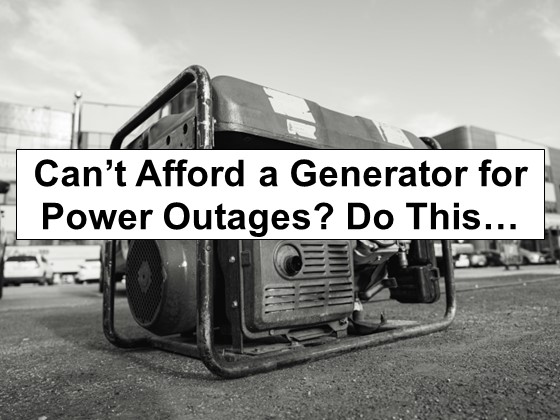Generators aren’t cheap, particularly anything worthwhile. Solar generators, while useful, are even more expensive by the time you add in the panels and battery add-ons. What’s worst of all is that many people buy the fancy generators, never use or maintain them, and find out years down the road that they can’t get the generator to start when needed most. Yikes! (I think my father-in-law bought his generator more than a decade ago and has never tried to get it running.)
For what it’s worth, I’d mentioned many years ago that I’m not a fan of generators. That said, there are some good reasons for having one around, such as for running a window air-conditioner during the relentless summer heat. But, for most of use cases, you can get by without one. With that in mind, the video below discusses several ways to do just that, most of which will help you stay better prepared for a variety of scenarios, not just a short-term power outage where a typical generator might prove useful.
For what it’s worth, the easiest (and least expensive) way I’m aware of for you to be prepared for short-term power outages is to purchase a power inverter. I used to recommend a lowly 800-watt inverter, but these days I suggest at least a 15000-watt or even 2000-watt Energizer inverter. Add in a long enough and thick enough extension cable (you may need to maneuver your vehicle and take some measurements) and a few cans of stabilized gasoline using PRI-G and you have a ready-made generator (in the form of your vehicle) sitting in your driveway already; this idea is briefly discussed in the video below about two-thirds in. Here’s what else you can do…
Power outages are increasingly frequent, leaving families, like yours, vulnerable and unprepared. Have you truly thought about what would happen if you lost power for days, weeks, or even longer? How horrible would a summer heatwave be without air conditioning? How deadly would a winter storm be without heat? Most people don’t believe problems like these can happen to them, but history has proven them wrong repeatedly.
Introducing The Lost Generator — a wonderful solution for ensuring you and your family never get left in the dark again. Whether you’re a homeowner, looking to go off-grid, or preparing for the unexpected, like I am, this is precisely how to keep your crucial equipment running when the grid goes down, even long-term.
Imagine the peace of mind that comes with knowing your family will have light, heat, air-conditioning, and be able to keep the refrigerator running, no matter what. This little known expert knowledge empowers you to choose the solution for your situation, set it up efficiently, and keep it maintained for long-term reliability. With The Lost Generator, power outages will become one less giant problem for you to worry about.
Don’t wait for the next blackout to strike, leaving you vulnerable or worse. Discover The Lost Generator now and get the tools and know-how to stay safe. Remember: your family’s well-being isn’t the neighbor’s responsibility. It’s not up to your friends or family to bail you out … and you absolutely cannot rely on the government to show up in time. The Lost Generator is the solution you’ve been waiting for.

Leave a Reply